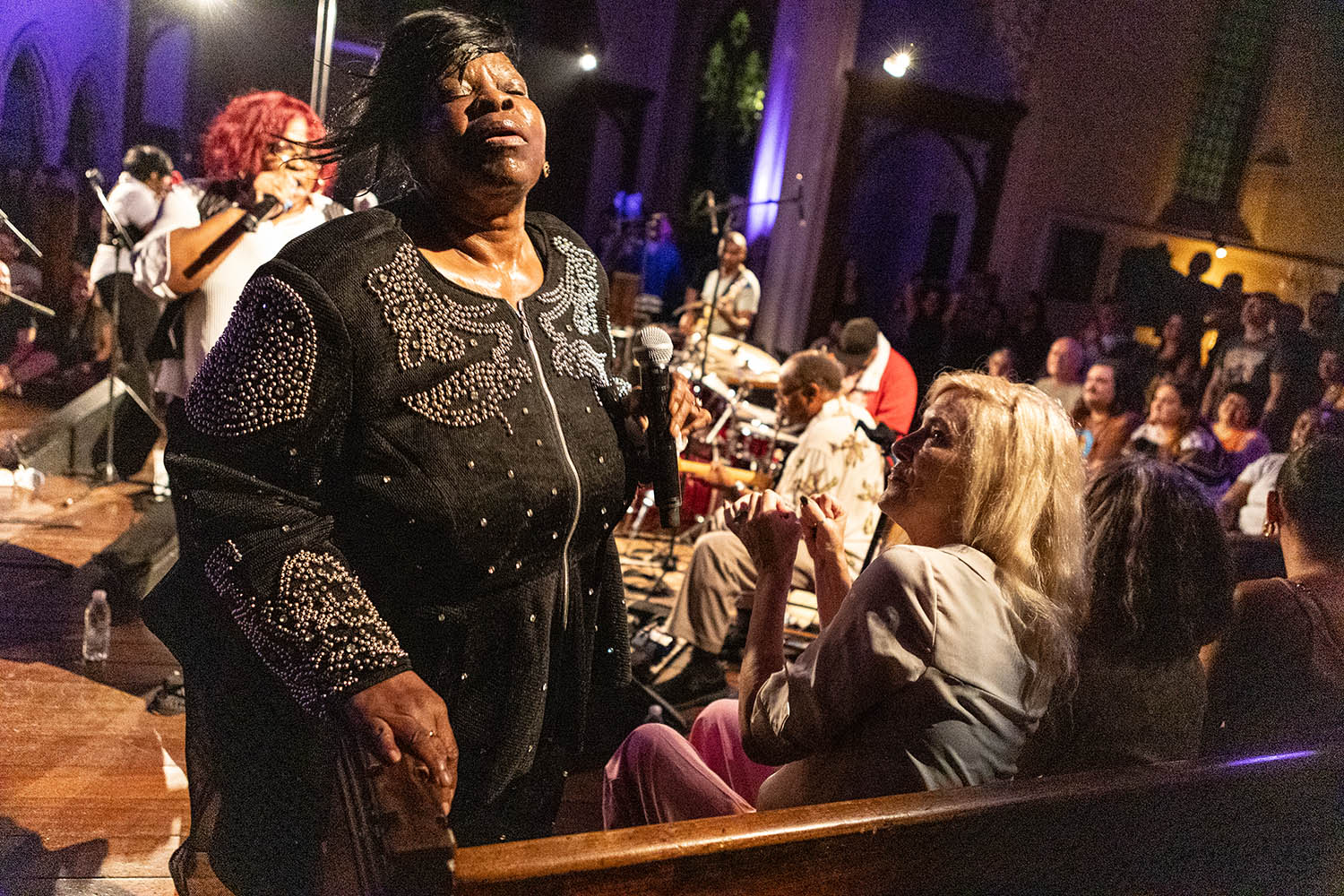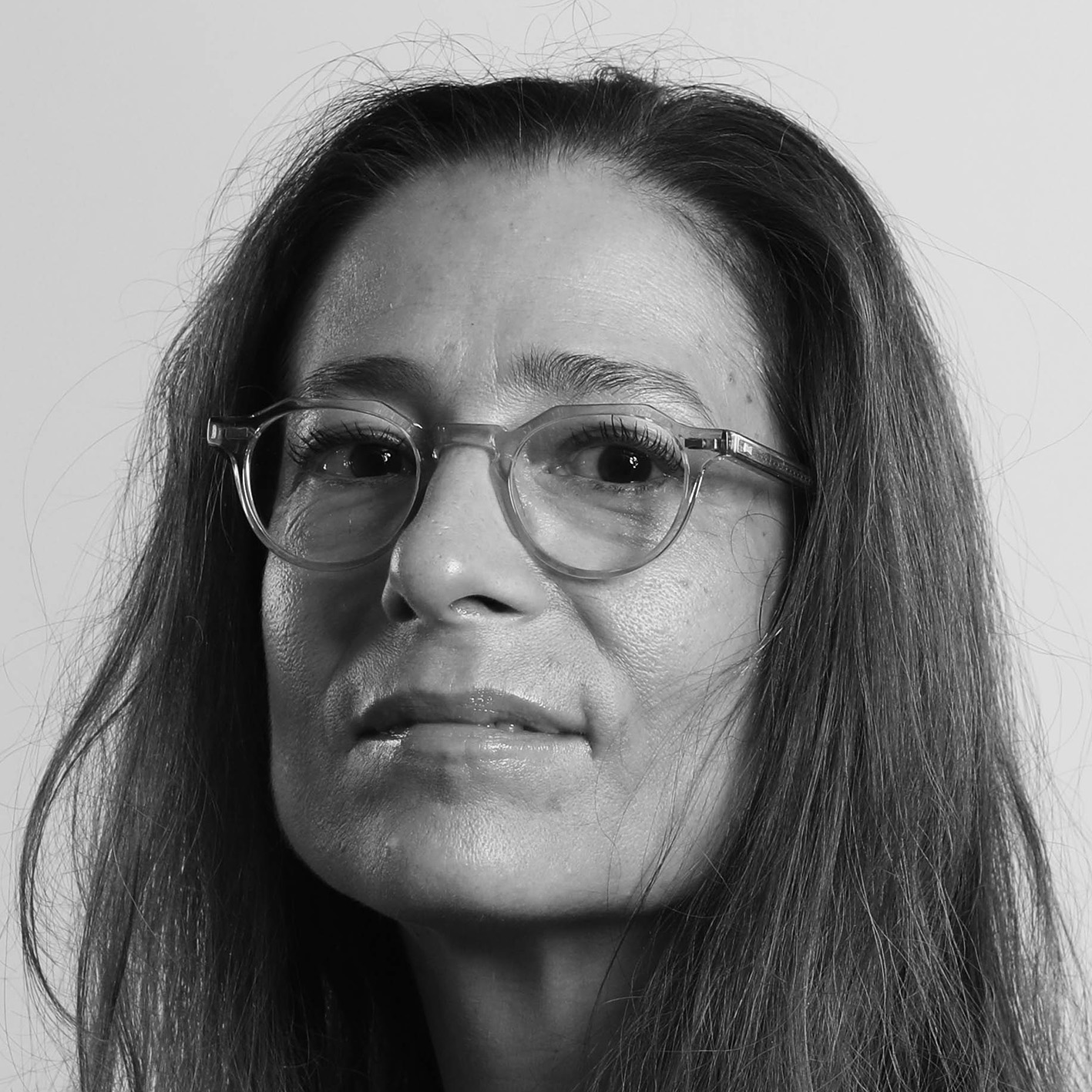“I made it!” sings gospel powerhouse Annie Caldwell, who is seated, but by no means at rest, in the centre of an east-London church. Two of her daughters, Deborah and Anjessica, and her goddaughter Toni Rivers, dancing at their microphones, amplify her call threefold: “We made it!”
Caldwell’s sons, Abel Aquarius and Willie Jr, mostly keep their heads down, making up the funk rhythm section that powers the family band. Caldwell’s husband, Willie Sr – also seated – coaxes disco-tinged grooves out of an electric guitar.
This is no ordinary gig. The seven Caldwells are set up in the round facing one another, with pews of punters arrayed beside and behind them. Volunteers from Hackney’s Made Up Kitchen, a community non-profit organisation, are serving up Indian food next to the bar. People are so close to the performers that, later, Caldwell or one of her daughters can pass around a microphone for even more interactive call-and-response.
Caldwell isn’t celebrating the later-in-life success she and her band are now experiencing, decades after forming – though she’d have every right to. The Caldwells began when Annie and Willie Sr decided to save their daughters from the temptations of secular music. After a career playing in churches, they recently released their latest album, Can’t Lose My (Soul), through Luaka Bop, the recherche label co-run by David Byrne.
It opened their music up to a new audience: the Caldwells now have a schedule packed full of secular music festival appearances, with dates to come in Japan, Brazil and South Korea. Remixes have poured out from all quarters.
The rousing I Made It is an affirmation of having overcome the hardest of times – specifically, the deaths of family members – with the strength and purpose of faith. Satan might have messed with Caldwell – “you dropped a bomb on me”, she huffs, to a disco groove – but she is still here, in an outfit so sparkly with appliqued diamante that it gives her the air of a pearly queen, pronouncing the power of hope in dark times.
Their songs speak of struggle and forbearance, but to joy as well, and the virtue of humility – not something you hear a lot about in 2025
Their songs speak of struggle and forbearance, but to joy as well, and the virtue of humility – not something you hear a lot about in 2025
The cultural influence of gospel music is difficult to overstate. The singer Mahalia Jackson was at the side of the Rev Dr Martin Luther King Jr when he famously spoke at the 1963 March on Washington, egging him on to: “Tell them about the dream, Martin.”
The church choir has long served as an incubator for talents that later re-emerged in soul, R&B and pop. It’s a revolving door: Michelle Williams became a gospel singer after she left Destiny’s Child. In more recent times, faith-based music has had a mainstream resurgence, notably in the works of the troubled rapper Kanye West; in the UK, Sault, the outfit led by producer Inflo, are prolific makers of spiritual music.
Gospel is subject to its own fluctuations in presentation; US star Kirk Franklin speaks to a contemporary audience with glossy and gritty mainstream sounds.
Secular audiences, though, are particularly drawn to the Caldwells’ retro uplift, their improvisations and ad libs, and their links to a tradition emphasising the trials and tribulations of ordinary people. In Don’t You Hear Me Calling, the family confront a serious medical diagnosis with prayer – and some louche funk. It’s a plea to a higher power to intervene, but Caldwell doubles down on her mother’s equanimity about the outcome. “Let your will be done,” she intones.
Newsletters
Choose the newsletters you want to receive
View more
For information about how The Observer protects your data, read our Privacy Policy
If the Caldwells have been waiting quite some while for recognition, it’s been an entire lifetime since Caldwell – then Annie Brown – first recorded as part of the Staples Jr Singers, a family gospel outfit inspired by fellow Mississippians the Staples Singers. Brown was 11 when they made their self-released album, When Do We Get Paid, in 1975. They sold 500 copies and then got on with their lives, singing in church, working jobs; alongside music, Caldwell runs a boutique in West Point, Mississippi – Caldwell Fashions.
The Staples Jr Singers experienced a revival pre-pandemic when their music was picked up by Luaka Bop, which reissued When Do We Get Paid – a relationship that enabled Caldwell’s current band to step into the limelight. Their songs speak of struggle and forbearance, but to joy as well, and the virtue of humility – not something you hear a lot about in 2025. Even if you have not taken Jesus into your life, the bluesier Rise Again and Can’t Lose My Soul provide two of the more shiver-inducing passages tonight. On Rise Again, not even death can keep Caldwell “in the ground”.
During the evening’s finale, Caldwell is unequivocal about the importance of protecting your soul – “my soul!” is the call and response as the mic is passed around, and the band hold formation. In their feelgood music that grapples with suffering, the Caldwells offer succour and redemption as nourishing as the platefuls of food served up by the door.
Photograph by Andy Hall for the Observer

